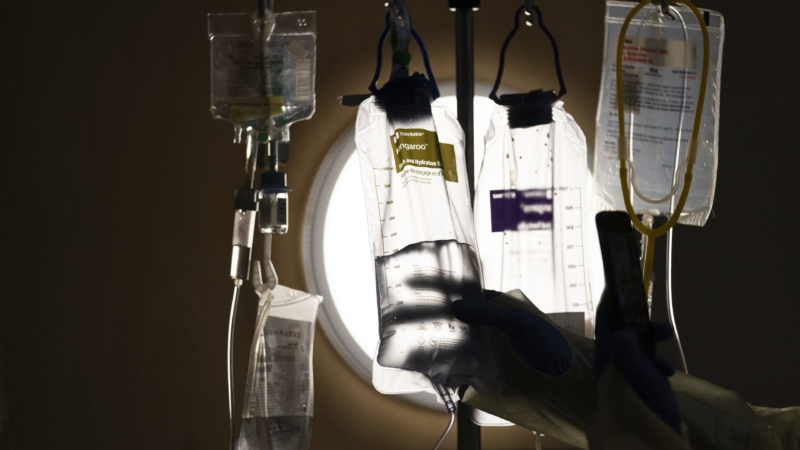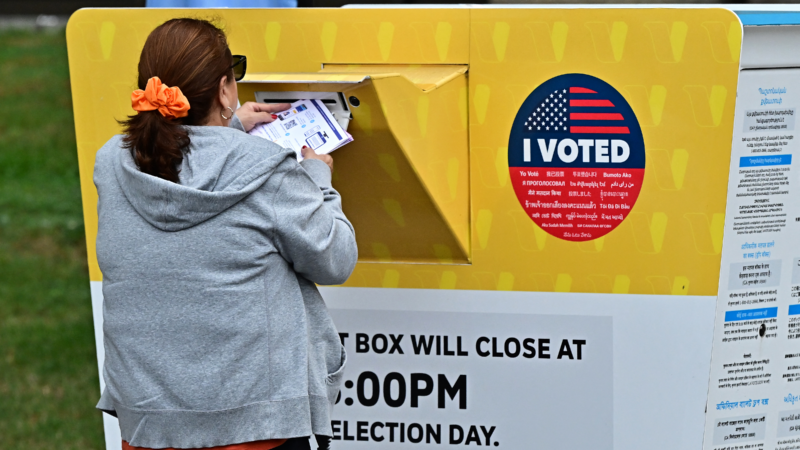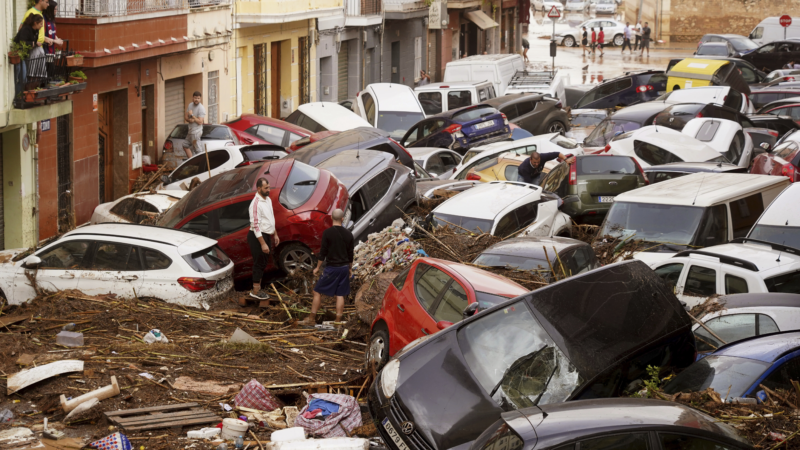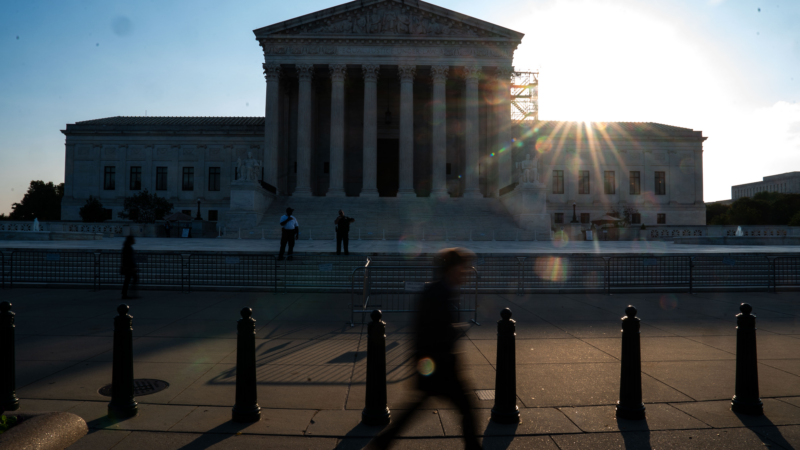Shortage of IV fluids leads to canceled surgeries
Surgery was Katie Adase’s best chance at finally getting a diagnosis for the chronic pelvic pain that has been plaguing her for years.
“I couldn’t do laundry or walk to the grocery store or even cook without having to then take like three or four hours to lay in bed with a heating pad,” says the 26-year-old biologist. “It’s been really scary.”
But in October, a few days before her surgical procedure was scheduled to take place, a nurse called. The surgery was off because there wasn’t enough IV fluid to proceed.
“I was having such a hard time processing what she was even saying to me, that I was just really quiet,” she says, explaining that the procedure had loomed large in her mind because so many other doctors had given up trying to figure out what was wrong with her.
Her diagnosis would have to wait.
Canceled surgeries have been a problem for patients around the country in the aftermath of Hurricane Helene. The storm flooded a Baxter International factory in North Carolina that was making 60% of the national supply of IV fluids, which are used routinely during many surgeries and procedures.
Conserving IV bags
Without the Baxter facility making IV fluids, hospitals can’t order as much as they normally would, according to the company.
So hospitals have had to conserve their supplies for the neediest patients. Sometimes, that means telling emergency room patients to drink a Gatorade or Pedialyte instead of getting an IV. But it has also meant canceling some surgeries.
“This shortage is still touching nearly every hospital in the country,” says Dr. Chris DeRienzo, chief physician executive of the American Hospital Association. “Now I’ve talked to hospitals coast to coast, border to border all over the country who are needing to engage in those kinds of measures.”
The surgeries most likely to be postponed or canceled include certain bladder surgeries, which require a lot of IV fluids, some heart procedures, orthopedic surgeries and things like Katie Adase’s diagnostic surgery.
But it varies from hospital to hospital.
Nancy Foster, AHA’s vice president for quality and patient safety, says all hospitals handle it a little differently, but it’s stressful no matter what.
“This, for many hospitals, comes on the heels of some other supply chain shortages. And of course, we’re still in this sort of emotional recovery from COVID,” she says. “There’s still a lot of people feeling some burnout. And so [the Baxter situation] added to that with this new shortage that no one expected.”
And the strain is even worse as the end of the year approaches, says DeRienzo. People get sick with winter respiratory viruses, and they schedule more surgeries because their health plans usually reset in January with new deductibles.
Crisis mode
At Massachusetts General Hospital in Boston, Dr. Paul Biddinger has handled disaster contingency planning for more than two decades as the chief preparedness and continuity officer.
He says the IV fluids shortage is a crisis.
“We have activated our emergency operations plan for the system,” says Biddinger. “And we’ve been in that mode now for weeks …, and that is all hands on deck. It’s the same thing we do for a hurricane or the Boston Marathon bombing or COVID.”
Biddinger’s hospital has been able to reduce IV fluid use by 50%, but it’s taken a huge effort. And procedures still get pushed off.
When it’s a knee or hip replacement surgery that gets canceled, sometimes the patient has been waiting months already, and rebooking can take time.
“And so they’re in pain, their risk of falling there,” Biddinger says. “There are very real consequences to patients and their families.”
Improving supply
Things are getting better as Baxter and the federal government work to bridge the supply gap while the North Carolina factory is cleaned up for a phased reopening.
The administration is invoking the Defence Production Act to help Baxter get the materials it needs for reopening. The Administration for Strategic Preparedness and Response and the Federal Emergency Management Agency also sent staff to rebuild a collapsed bridge to the facility, and the Food and Drug Administration allowed temporary importation of 19 different IV products from around the world in the meantime.
Meanwhile, Baxter says it hopes to resume some production of the highest priority IV fluids at the facility this week and is ahead of schedule.
But it will take time for that supply to hit hospital loading docks. And the Baxter facility won’t be back to full capacity until at least next year.
Still, some patients NPR spoke to say their canceled surgeries have since been rescheduled and happened without incident.
As for Katie Adase in West Virginia, her surgery has been rescheduled for Nov. 1. She says she’s lucky to have the support system she has, but patients are paying a price even if things work out in the end.
“So that leaves me to fix up all of my logistics,” she says. “So I’m racking up medical debt. I’m racking up debt from traveling. I’m feeling guilty that, you know, my husband took off work for nothing.”
Transcript:
MARY LOUISE KELLY, HOST:
IV fluids used in hospitals are still in short supply after Hurricane Helene shut down a key North Carolina factory that makes them. The closure has put hospitals in crisis mode and some patients in limbo, as NPR pharmaceuticals correspondent Sydney Lupkin reports.
SYDNEY LUPKIN, BYLINE: Katie Adase has been trying to get a diagnosis for her chronic pelvic pain for years. But so far, no doctor has been able to figure it out.
KATIE ADASE: I couldn’t do laundry or walk to the grocery store or, like, even cook without having to then take three or four hours to lay in bed with a heating pad. So it’s been really scary.
LUPKIN: The 26-year-old biologist eventually got referred to a physician who specializes in endometriosis. By the time she got the appointment, though, she had moved across the country. Diagnosing the cause of her symptoms required a surgery. The procedure was scheduled for early October. She and her husband flew back to West Virginia a few days before the pre-op appointment. While they were there, Hurricane Helene hit. Four days before the scheduled surgery, a nurse called. The surgery was canceled because they didn’t have enough IV fluids.
ADASE: I was having such a hard time processing what she was even saying to me that I was just really quiet.
LUPKIN: Her diagnosis would have to wait. That’s a problem for patients around the country in the aftermath of Hurricane Helene. The storm flooded a Baxter International factory in North Carolina that was making 60% of the national supply of IV fluids. Hospitals have had to adjust by conserving IV fluids for the neediest patients. Often, that means asking emergency room patients to drink a Gatorade or a Pedialyte instead of getting an IV, but it also means canceling scheduled surgeries and procedures.
CHRIS DERIENZO: This shortage is still touching nearly every hospital in the country. Now, I’ve talked to hospitals coast-to-coast, border-to-border, all over the country who are needing to engage in those kinds of measures.
LUPKIN: That was Dr. Chris DeRienzo, chief physician executive of the American Hospital Association. The surgeries most likely to be postponed or canceled includes certain bladder surgeries, which require a lot of IV fluids, some heart procedures, orthopedic surgeries and things like Katie Adase’s diagnostic surgery. But it varies from hospital to hospital. At Mass General Hospital in Boston, Dr. Paul Biddinger has handled disaster preparedness for more than two decades. He says the IV fluid shortage is a crisis.
PAUL BIDDINGER: We have activated our emergency operations plan for the system, and we’ve been in that mode now for weeks – last couple weeks. And that is an all-hands-on-deck. It’s the same thing we do for a hurricane or the Boston Marathon bombing or COVID.
LUPKIN: He said his hospital has been able to reduce IV fluid use by 50%, but it has taken a huge effort, and procedures still get pushed off. When it’s a knee or hip replacement surgery that gets canceled, sometimes the patient has been waiting months already, and rebooking can take time.
BIDDINGER: And so they’re in pain. They’re at risk of falling. There are very real consequences to patients and their families.
LUPKIN: Things are getting better, as Baxter and the government work to bridge the supply gap while the North Carolina factory is cleaned up for reopening in phases, but it will take time for that supply to hit hospital loading docks. Baxter says it hopes to resume some production of the highest-priority IV fluids very soon and is ahead of schedule. Some patients NPR spoke to say their canceled surgeries have since been rescheduled and happened without incident. As for Katie Adase in West Virginia, her surgery has been rescheduled for November 1.
ADASE: So that leaves me to, you know, fix up all of my logistics. So I’m racking up medical debt. I’m racking up debt from traveling. I’m feeling guilty that, you know, my husband took off work for nothing.
LUPKIN: She says she’s lucky to have the support system she has, but patients are paying a price even if things work out in the end.
Sydney Lupkin, NPR News.
The U.S. economy is growing solidly. Here’s what’s working — and what’s not
The U.S. economy grew at an annual rate of 2.8% in the third quarter, led by strong consumer spending. The news comes days before a presidential election in which the economy has been top of mind for many voters.
Worried about your 2024 ballot being counted? These states let you track it online
“There's no need to panic,” an elections expert tells NPR. All but three states have free tracking sites that send updates to voters as their ballot goes through the system.
Handsy fans disrupted a World Series game. Here are 5 notable MLB interference cases
Two Yankees fans were ejected from Game 4 of the World Series for trying to pry a ball out of a Dodgers player’s glove. It's a particularly brazen instance of fan interference, but far from the first.
In ‘A Real Pain,’ Jewish cousins tour Poland, cracking jokes and confronting the past
In this almost perfect little film, Jesse Eisenberg and Kieran Culkin play cousins who reconnect in Poland to honor the memory of their grandmother, a Holocaust survivor.
Spain flooding: Photos show the devastation in Valencia
Authorities in the region report at least 70 people have been killed after torrential rain overpowered the area.
Supreme Court allows Virginia to purge individuals from voter rolls
The court's order comes less than a week before the 2024 general election.








